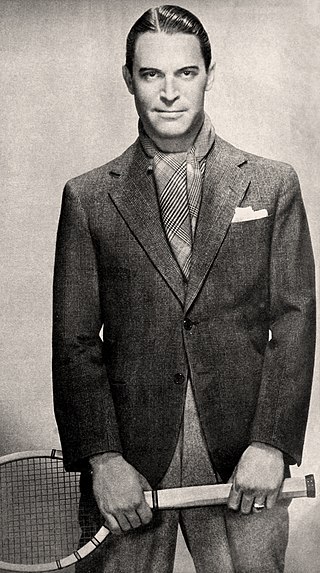
John Chester Brooks Morris was an American stage, film, television, and radio actor. He had some prestigious film roles early in his career, and received an Academy Award nomination for Alibi (1929). Morris is remembered for portraying Boston Blackie, a criminal-turned-detective, in the Boston Blackie film series of the 1940s.

Una O'Connor was an Irish-born American actress who worked extensively in theatre before becoming a character actress in film and in television. She often portrayed comical wives, housekeepers and servants. In 2020, she was listed at number 19 on The Irish Times list of Ireland's greatest film actors.

William Mervyn Pickwoad was an English actor best known for his portrayal of the bishop in the clerical comedy All Gas and Gaiters, the old gentleman in The Railway Children and Inspector Charles Rose in The Odd Man and its sequels.

John Michael Terence Wellesley Denison was an English actor. He often appeared with his wife, Dulcie Gray, with whom he featured in several films and more than 100 West End theatre productions.
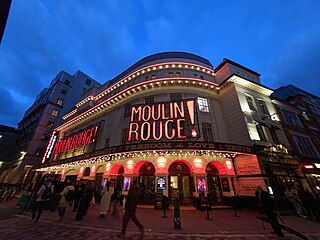
The Piccadilly Theatre is a West End theatre located at the junction of Denman Street and Sherwood Street, near Piccadilly Circus, in the City of Westminster, London. It opened in 1928.

Anthony Martin Kimmins, OBE was an English director, playwright, screenwriter, producer and actor.
Kelville Ernest Irving was an English music director, conductor and composer, primarily remembered as a theatre musician in London between the wars, and for his key contributions to British film music as music director at Ealing Studios from the 1930s to the 1950s.
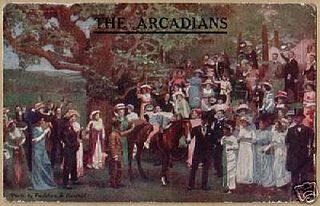
Arthur Harold Wimperis was an English playwright, lyricist and screenwriter, who contributed lyrics and libretti to popular Edwardian musical comedies written for the stage. But, with the advent of talking films, he switched to screenwriting, finding even greater success in this medium.

Bertha Belmore was an English stage and film actress. Part of the Belmore family of British actors through her marriage to actor Herbert Belmore, she began her career as a child actress in British pantomimes and music hall variety acts. As a young adult she was one of the Belmore Sisters in variety entertainment before beginning a more serious acting career performing in classic plays by William Shakespeare with Ben Greet's Pastoral Players in a 1911 tour of the United States. She made her Broadway debut as Portia in Shakespeare's Julius Caesar in 1912. She returned to Broadway numerous times in mainly comedic character roles over the next 40 years, notably creating parts in the original Broadway productions of Lorenz Hart and Richard Rodgers's By Jupiter (1942) and Anita Loos's Gigi (1951). She worked in several productions mounted by Florenz Ziegfeld Jr., including appearing in the Ziegfeld Follies of 1925 with W.C. Fields and Will Rogers, and starring as Parthy Ann Hawks in the 1929 Australian tour and 1932 Broadway revival of Jerome Kern and Oscar Hammerstein II's Show Boat.
Samuel George Herbert Mason was a British film director, producer, stage actor, army officer, presenter of some revues, stage manager, stage director, choreographer, production manager and playwright. He was a recipient of the Military Cross the prestigious award for "gallantry during active operations against the enemy." He received the gallantry award for his part in the Battle of Guillemont where British troops defeated the Germans to take the German stronghold of Guillemont.

James Alexander Chapman, known by his stage name, Jay Laurier, was an English actor. Early in his career he was a music hall performer, but by the late 1930s he was playing in the works of Shakespeare at the Shakespeare Memorial Theatre in Stratford-upon-Avon as well as having a career in films.
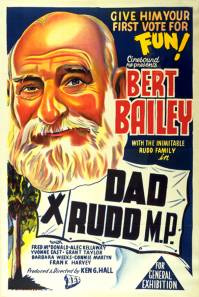
Dad Rudd, M.P. is a 1940 comedy that was the last of four films made by Ken G. Hall starring Bert Bailey as Dad Rudd. It was the last feature film directed by Hall prior to the war and the last made by Cinesound Productions, Bert Bailey and Frank Harvey.
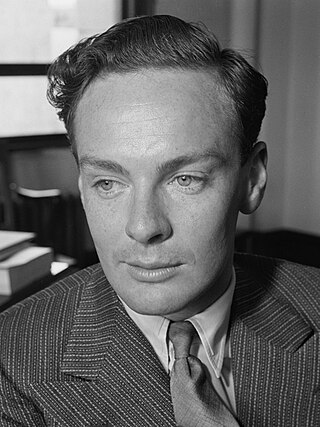
John Wood was an Australian who acted on the stage and briefly became a film star in Hollywood and Britain in the late 1930s.
The Comedy Theatre was a Broadway theatre located at 110 West 41st Street in Manhattan that opened in 1909. It presented the first Broadway appearances of Katharine Cornell and Ruth Draper, as well as Eugene O'Neill's first Broadway play. Shuttered in the wake of the Depression, it reopened in 1937 as the Mercury Theatre — the venue for Orson Welles's groundbreaking adaptation of Shakespeare's Julius Caesar and other productions for the Mercury Theatre repertory company. In 1939 it began presenting classic Yiddish theatre. The building was demolished in 1942.
Warn That Man! is a 1941 comedy thriller play by the British writer Vernon Sylvaine. A comedy-thriller, its plot concerns an attempt to kidnap wartime Prime Minister Winston Churchill from an English country house.
Margaret Towner was a British stage, film, and television actress. Following decades of theatre work, Towner achieved fame among film audiences when she appeared in a small, but significant, role as Jira in the 1999 Star Wars prequel, Star Wars: Episode I – The Phantom Menace. In 2014, at the age of 93, Towner returned to screen acting for a 13-episode role as Edna on Ricky Gervais' television series, Derek, becoming one of the oldest working actresses in the United Kingdom.

But for the Grace of God is a play by the British writer Frederick Lonsdale. A murder melodrama, different from his standard light comedies, it ran for 203 performances at St James's Theatre in the West End between 3 September 1946 and 1 March 1947. The original cast included Michael Gough, A.E. Matthews, Mary Jerrold and Yvonne Owen.
The Fabulous Invalid is a 1938 stage play by George S. Kaufman and Moss Hart following the oscillating fortunes of a fictitious Broadway theater, the Alexandria, in the period between 1900 and 1930. The play's title has since entered the vernacular as a synonym for the theater.
Reginald Hartley Fenderson was an American actor in theatrical productions and films in the United States. He appeared in various films with African American casts in the 1930s and 1940s.
Let Tyrants Tremble! is a 1946 comedy play by the British writer Bernard Miles revolving around a unit of the Home Guard.












